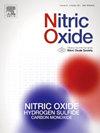Nitric oxide-mediated regulation of macronutrients in plants
IF 3.2
2区 生物学
Q2 BIOCHEMISTRY & MOLECULAR BIOLOGY
引用次数: 0
Abstract
In plant physiology, nitric oxide (NO) is a widely used signaling molecule. It is a free radical and an important component of the N-cycle. NO is produced endogenously inside plant cells, where it participates in multiple functions and provides protection against several abiotic and biotic stresses. NO and its interplay with macronutrients had remarkable effects on plant growth and development, the signaling pathway, and defense mechanisms. Its chemical properties, synthetic pathways, physiological effects, antioxidant action, signal transduction, and regulation of transporter genes and proteins have been studied. NO emerges as a key regulator under macronutrient deficiency. In plants, NO also affects reactive oxygen species (ROS), reactive nitrogen species (RNS), and post-translational modifications (PTMs). The function of NO and its significant control in the functions and adjustments of macronutrients under macronutrient deficit were summed up in this review. NO regulate functions of macronutrients and associated signaling events involved with macronutrient transporters in different plants.
一氧化氮介导的植物体内大量营养素的调节。
在植物生理学中,一氧化氮(NO)是一种广泛使用的信号分子。它是一种自由基,也是 N 循环的重要组成部分。一氧化氮由植物细胞内源产生,在细胞内参与多种功能,并提供抵御多种非生物和生物胁迫的保护。NO 及其与主要营养素的相互作用对植物的生长发育、信号途径和防御机制有显著影响。人们对 NO 的化学特性、合成途径、生理效应、抗氧化作用、信号转导以及对转运体基因和蛋白质的调控进行了研究。在缺乏大量营养素的情况下,NO 成为一个关键的调节因子。在植物体内,NO 还影响活性氧(ROS)、活性氮(RNS)和翻译后修饰(PTM)。本综述总结了 NO 的功能及其在常量营养元素缺乏时对常量营养元素功能和调节的重要调控作用。NO 在不同植物中调控大量营养素的功能以及与大量营养素转运体相关的信号转导事件。
本文章由计算机程序翻译,如有差异,请以英文原文为准。
求助全文
约1分钟内获得全文
求助全文
来源期刊

Nitric oxide : biology and chemistry
生物-生化与分子生物学
CiteScore
7.50
自引率
7.70%
发文量
74
审稿时长
52 days
期刊介绍:
Nitric Oxide includes original research, methodology papers and reviews relating to nitric oxide and other gasotransmitters such as hydrogen sulfide and carbon monoxide. Special emphasis is placed on the biological chemistry, physiology, pharmacology, enzymology and pathological significance of these molecules in human health and disease. The journal also accepts manuscripts relating to plant and microbial studies involving these molecules.
 求助内容:
求助内容: 应助结果提醒方式:
应助结果提醒方式:


